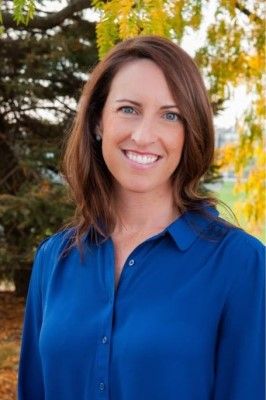Interview with Stacy Ingraham, Licensed Professional Counselor, Psychotherapist, and Instructor
Stacey Ingraham is a Licensed Professional Counselor and psychotherapist who owns her own practice, Stacy Ingraham LLC. She works with adults who struggle with depression, anxiety, body image issues, grief and loss, self-esteem, life transitions, and trauma. In addition to her counseling degree, she is trained in eye movement desensitization and reprocessing (EMDR), is a graduate of the Gestalt Institute, and has completed Gottman Level 1 couples therapy training. Stacey is also an adjunct instructor for the clinical mental health counseling graduate program at the University of Dayton.
1. Can you explain the educational path you took in in pursuit of your counseling career?
 After earning my bachelor’s degree in English, I worked in higher education admissions for six years before starting the University of Dayton’s clinical counseling master’s degree program. Those six years were full of personal and professional growth and invaluable to my work as a clinical counselor. The coursework in graduate school can provide a solid clinical foundation; yet developing an art and skill for counseling and psychotherapy comes from working with clients, working on oneself (I strongly believe that mental health clinicians should pursue their own therapy), consulting with colleagues and mentors, and engaging in clinical training throughout one’s career. I remain active in professional organizations and training in Gestalt therapy, Gottman couples therapy, EMDR, and Internal Family Systems.
After earning my bachelor’s degree in English, I worked in higher education admissions for six years before starting the University of Dayton’s clinical counseling master’s degree program. Those six years were full of personal and professional growth and invaluable to my work as a clinical counselor. The coursework in graduate school can provide a solid clinical foundation; yet developing an art and skill for counseling and psychotherapy comes from working with clients, working on oneself (I strongly believe that mental health clinicians should pursue their own therapy), consulting with colleagues and mentors, and engaging in clinical training throughout one’s career. I remain active in professional organizations and training in Gestalt therapy, Gottman couples therapy, EMDR, and Internal Family Systems.
2. What would you recommend that prospective students look for when choosing a counseling degree program?
When possible, I recommend choosing a program that is Council for Accreditation of Counseling & Related Educational Programs (CACREP) accredited and can be primarily pursued in person with limited online coursework. During your search, ask where students pursue their practicum and internship – it’s important that there are many diverse sites to choose from. Faculty who are or have recently worked clinically with clients will be beneficial in your learning process. Consider whether there is a chapter of Chi Sigma Iota, the international honor society for counseling students, counselor educators, and professional counselors, which is just one way to get involved and network outside of the classroom.
3. What is your counseling philosophy?
I believe my role as a clinical counselor and psychotherapist is to help facilitate healing, change, and growth with the people I work with. While being a skilled listener and observer is imperative to my work, I also believe that providing supportive feedback, asking questions that provoke insight, and providing homework for clients to do between sessions is imperative to healing, change, and growth.
4. Your practice is founded upon the principles of Gestalt therapy. Can you explain that type of therapy? What other therapeutic modalities do you use?
Gestalt therapy is widely practiced internationally and is experiential and existential. In my experience, Gestalt therapy gets to the heart of what’s causing a person to struggle. Gestalt therapy is present-centered, mindfulness is a component, and the approach is holistic in that we consider the mind, body, and soul in our approach to treatment. Gestalt therapy is the foundation of my work, and I’ve found that EMDR, Internal Family Systems, Gottman couples therapy, and cognitive behavioral techniques are also beneficial depending on each person’s individual needs or diagnosis.
5. What are some of the biggest challenges that counselors face?
Burnout is one of the biggest issues I see counselors (as well as other mental health clinicians) facing. This is in part due to a shortage in funding and therefore a lack of pay, or being overworked, as well as counselors not engaging in their own care.
6. Is there any other advice you’d give to counselors who are new to the profession?
A few pieces of advice include starting therapy with a licensed clinician, talking with clinical counselors about their experiences and asking for guidance, remembering that networking is essential to professional growth and opportunities, engaging in as many clinical opportunities as possible before setting out on your own in private practice, and getting really skilled at setting boundaries and taking good care of yourself or you will not be able to care for others.
We’re thankful to Stacey Ingraham for sharing her insight and experience with our readers. For more on her counseling work or to read her blog, visit her website, Stacy Ingraham LLC and follow her on LinkedIn.
